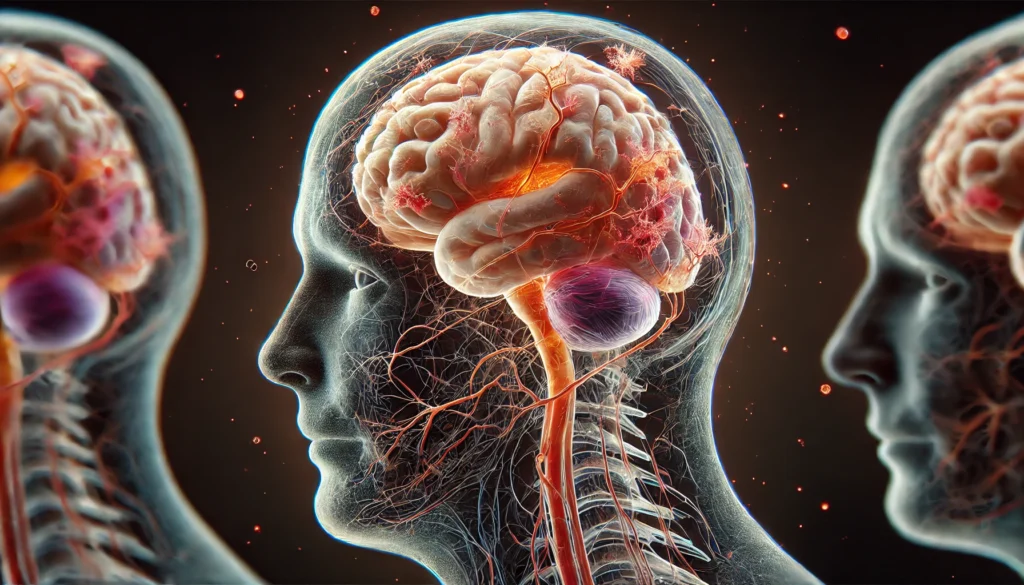Introduction
As life expectancy continues to rise, the importance of maintaining cognitive health well into older age has become a central focus for both scientists and the general population. While it’s normal for some mental faculties to shift subtly with age, more significant losses in memory, decision-making, and processing speed may signal the onset of cognitive decline. Understanding how to stop cognitive decline is no longer just a subject for research papers—it’s a pressing issue for millions seeking to maintain their independence, clarity, and quality of life.
You may also like: How Cognitive Brain Functioning Shapes Memory, Focus, and Mental Clarity: Exploring the Science Behind Peak Performance
Thanks to an explosion of scientific insights, we now know that the brain is far more adaptable and resilient than once believed. The concept of neuroplasticity has shown that the brain retains the ability to reorganize itself by forming new neural connections throughout life. This opens the door to actionable strategies for the prevention of cognitive decline. From diet and exercise to sleep and stress management, a variety of factors influence brain aging—many of which are within our control.
This article explores the most up-to-date, evidence-based interventions that can help preserve brain health. Whether you’re in your 30s aiming for longevity or in your 60s hoping to retain your cognitive sharpness, the science-backed steps provided here offer a roadmap to maintain and even enhance your mental faculties over time. The goal is not only to delay aging-related decline but to promote brain longevity that supports vibrant thinking, emotional balance, and lifelong learning.

Understanding the Biological Basis of Cognitive Decline
Cognitive decline typically arises from a combination of biological, environmental, and lifestyle-related factors. Brain shrinkage, loss of synaptic connections, reduced neurogenesis, and neuroinflammation are all part of the neurodegenerative process. However, these phenomena do not occur uniformly or inevitably. Some individuals age with minimal impairment, while others experience accelerated deterioration. Genetics plays a role, but lifestyle and environment have profound influence over the trajectory of cognitive health.
One major player in age-related cognitive decline is chronic low-grade inflammation. Often termed “inflammaging,” this persistent state of inflammation damages neurons and impairs their ability to communicate effectively. Alongside this, oxidative stress—caused by an imbalance between free radicals and antioxidants—further damages cellular structures including mitochondria, the energy-producing units of brain cells.
Another critical aspect involves the health of the brain’s vasculature. Impaired blood flow deprives neurons of oxygen and essential nutrients, compounding the risk of neurodegeneration. This is why conditions like hypertension, diabetes, and atherosclerosis are closely linked with cognitive decline. Therefore, the prevention of cognitive decline must involve a multidimensional approach that addresses inflammation, oxidation, vascular health, and metabolic function.

Diet and Nutrition for Brain Longevity
Nutrition is perhaps the most modifiable and impactful factor in brain aging. Studies consistently show that diets rich in antioxidants, polyphenols, healthy fats, and anti-inflammatory compounds promote neuronal resilience. The Mediterranean diet—high in fruits, vegetables, whole grains, fish, nuts, and olive oil—has been repeatedly associated with a lower risk of cognitive impairment and Alzheimer’s disease.
Particularly beneficial nutrients include omega-3 fatty acids (especially DHA), which are vital for neuronal membrane fluidity and synaptic function. B-vitamins such as B6, B9 (folate), and B12 are essential for homocysteine metabolism and DNA methylation—processes directly affecting brain function. Vitamin D deficiency has also been linked to increased dementia risk.
Flavonoids, found in berries, tea, and cocoa, are another group of compounds shown to support cognitive performance by enhancing blood flow to the brain and reducing oxidative stress. Furthermore, maintaining stable blood sugar through low-glycemic foods helps prevent insulin resistance, which is increasingly implicated in neurodegenerative diseases.
Dietary strategies such as intermittent fasting or time-restricted eating may further support brain health by inducing autophagy, a cellular cleanup process that removes damaged structures and proteins associated with aging. By implementing these nutritional strategies, individuals can take meaningful steps in the prevention of cognitive decline.
Exercise and Movement as Cognitive Protectors
Physical activity exerts profound effects on brain health. Aerobic exercise enhances blood flow to the brain, increases the volume of the hippocampus (a region critical for memory), and stimulates the release of brain-derived neurotrophic factor (BDNF), a key protein that supports neuron survival and synaptic plasticity.
Numerous studies have shown that regular exercise is associated with a reduced risk of cognitive decline and dementia. In fact, physical activity has been described as one of the most potent interventions for promoting brain longevity. Importantly, exercise also reduces systemic inflammation and improves metabolic health—further bolstering its neuroprotective effects.
Resistance training, while often overlooked, plays an important role as well. It improves insulin sensitivity, reduces cortisol levels, and supports structural brain integrity. Engaging in a mix of cardiovascular, strength, and flexibility exercises appears to be the optimal formula for comprehensive cognitive support.
Incorporating movement into daily life doesn’t necessarily require intense workouts. Even brisk walking, gardening, or dancing can stimulate the brain and help with the prevention of cognitive decline. What matters most is consistency and variety.

The Importance of Sleep in Cognitive Preservation
Sleep is not just restorative; it’s regenerative. During deep sleep, the brain undergoes critical housekeeping functions, including the clearance of beta-amyloid plaques and tau tangles—hallmark features of Alzheimer’s disease. Disrupted sleep impairs memory consolidation, attention, and emotional regulation, and is a recognized risk factor for cognitive decline.
Chronic sleep deprivation increases cortisol levels, promoting hippocampal atrophy and exacerbating inflammation. Moreover, sleep apnea—a condition that causes intermittent oxygen deprivation—has been linked to structural brain changes and memory loss.
To support brain longevity, experts recommend 7 to 9 hours of high-quality sleep per night. Sleep hygiene practices such as limiting screen time before bed, maintaining a consistent sleep-wake schedule, and creating a dark, quiet sleep environment are foundational habits. Additionally, reducing caffeine and alcohol intake can improve sleep quality, as can stress reduction strategies like meditation or breathing exercises.
For individuals struggling with persistent sleep issues, medical evaluation is essential. Treating conditions like insomnia or sleep apnea can dramatically improve cognitive performance and slow the trajectory of decline.
Stress Management and Mental Resilience
Chronic psychological stress exerts a destructive influence on the brain. Elevated cortisol levels damage the hippocampus, impair neurogenesis, and increase the risk of depression and anxiety—both of which are independent risk factors for cognitive decline. This makes stress management a core pillar in the prevention of cognitive decline.
Mind-body practices such as mindfulness meditation, yoga, tai chi, and progressive muscle relaxation have demonstrated the ability to reduce stress markers and enhance cognitive performance. In particular, mindfulness-based stress reduction (MBSR) has been shown to improve working memory, attention, and executive function.
Social connection is another powerful buffer against cognitive decline. Loneliness and isolation are associated with increased risk of dementia, whereas regular social interaction stimulates neural pathways involved in empathy, language, and emotional regulation.
Resilience training—which includes positive psychology techniques like gratitude journaling, cognitive reframing, and goal setting—can further enhance mental flexibility and stress resistance. These tools not only improve mental health but strengthen brain circuits that are essential for lifelong cognitive health.

Cognitive Training and Lifelong Learning
Engaging the brain in mentally stimulating activities builds cognitive reserve—a buffer that allows the brain to function well even when affected by age or pathology. This concept supports the practice of lifelong learning as a core element in the prevention of cognitive decline.
Activities that challenge the brain include learning new skills (such as a language or musical instrument), solving puzzles, playing strategic games, or taking up hobbies that require coordination and concentration. The novelty and complexity of the task are key to activating and strengthening new neural circuits.
Digital platforms offering brain training exercises have shown mixed results, but structured cognitive training programs—particularly those tailored to individual needs and skill levels—can improve attention, processing speed, and memory. Importantly, combining cognitive training with physical activity enhances the benefits, creating synergistic effects on brain health.
Education, curiosity, and intellectual engagement throughout life contribute significantly to brain resilience. Whether through formal education, travel, or autodidactic pursuits, intellectual stimulation is an investment in long-term mental clarity.
Medical Interventions and Risk Factor Management
While lifestyle factors are foundational, medical evaluation and targeted interventions are critical for those at risk or already experiencing cognitive changes. Several medical conditions are known to accelerate cognitive decline, including hypertension, diabetes, hyperlipidemia, hypothyroidism, and mood disorders.
Routine monitoring and management of blood pressure, cholesterol, and blood sugar can reduce cerebrovascular damage and preserve cognitive function. In some cases, medications may be necessary to control these conditions and protect brain health.
Hormonal imbalances, particularly in thyroid function or sex hormones like estrogen and testosterone, can also affect cognition. Addressing these through appropriate medical therapy may improve mental clarity and prevent further decline.
Emerging research is exploring pharmacological agents, nootropics, and neuroprotective supplements that may enhance cognition. These include compounds such as citicoline, phosphatidylserine, curcumin, resveratrol, and omega-3s. However, such supplements should be used under the guidance of a healthcare provider and not as a substitute for foundational lifestyle changes.
The Gut-Brain Axis and Cognitive Health
The gut-brain connection is gaining recognition as a significant factor in brain health. The gut microbiota communicates with the brain through hormonal, neural, and immune pathways, influencing mood, cognition, and neuroinflammation.
An imbalance in gut bacteria (dysbiosis) can lead to systemic inflammation and has been linked to depression, anxiety, and cognitive decline. Conversely, a diverse and balanced microbiome supports the production of neurotransmitters like serotonin, dopamine, and GABA.
Diets rich in fiber, prebiotics, and fermented foods promote gut health. Examples include vegetables, legumes, kefir, yogurt, sauerkraut, and kimchi. Probiotics may offer benefits as well, particularly strains like Lactobacillus and Bifidobacterium.
The prevention of cognitive decline increasingly involves gut health optimization. While research is still emerging, early evidence suggests that improving gut integrity and microbiota diversity can indirectly support mental performance and emotional stability.
Frequently Asked Questions
1. What are the most effective strategies for the prevention of cognitive decline?
The most effective strategies involve a multi-pronged approach: a nutrient-dense diet, regular physical activity, quality sleep, stress management, cognitive training, social engagement, and medical monitoring. These interventions work synergistically to protect neurons, reduce inflammation, and enhance brain plasticity. While no single intervention guarantees prevention, combining these habits maximizes the chances of preserving mental clarity across the lifespan.
2. At what age should people start focusing on how to stop cognitive decline?
Cognitive decline can begin subtly as early as the 30s or 40s, though it is more noticeable in later decades. Therefore, the best time to begin prevention strategies is in early adulthood or middle age. However, it’s never too late to start. Even individuals in their 60s or 70s can experience measurable cognitive improvements with appropriate lifestyle changes. Early action yields the most protection, but late interventions can still be highly beneficial.
3. Can diet alone prevent cognitive decline?
While diet plays a foundational role in brain health, it is rarely sufficient on its own. Nutritional habits must be part of a broader strategy that includes exercise, sleep, stress management, and cognitive stimulation. That said, diets like the Mediterranean, MIND, and anti-inflammatory regimens have shown powerful effects in slowing cognitive aging and reducing Alzheimer’s risk. Combined with other healthy habits, nutrition can be a potent tool in the prevention of cognitive decline.
4. How much exercise is needed to support brain health?
Current guidelines recommend at least 150 minutes of moderate aerobic activity per week, along with two sessions of strength training. However, benefits can begin with much less. Even walking 30 minutes a day has been shown to improve memory and executive function. Consistency matters more than intensity, and combining aerobic, resistance, and flexibility training yields the most comprehensive benefits for cognitive health.
5. What role does sleep play in how to stop cognitive decline?
Sleep is essential for memory consolidation, emotional processing, and detoxification of the brain. Chronic poor sleep increases the risk of cognitive impairment, mood disorders, and neurodegeneration. Improving sleep hygiene and treating conditions like insomnia or sleep apnea are vital in any brain health plan. Sleep acts as a nightly reset, allowing the brain to repair, organize, and protect itself.
6. Are there warning signs of cognitive decline to watch for?
Yes. Early warning signs may include forgetfulness, difficulty concentrating, frequent word-finding problems, disorganization, and mood swings. These changes often go unnoticed until they interfere with daily life. Recognizing and addressing these symptoms early allows for more effective intervention and greater chances of cognitive stabilization or recovery.
7. How does social interaction affect brain health?
Social connection stimulates areas of the brain responsible for empathy, language, memory, and emotion. Isolation, on the other hand, increases the risk of cognitive decline and depression. Regular interaction with friends, family, or community groups helps maintain cognitive function and emotional well-being. Engaging in meaningful conversations, sharing experiences, and being part of a social network are all protective factors for the aging brain.
8. Is there a genetic component to cognitive decline?
Yes, genetics can influence one’s risk of developing conditions like Alzheimer’s disease. The presence of the APOE-ε4 gene variant is one such example. However, genetics account for only part of the risk. Lifestyle factors and environmental exposures play a much larger role in determining whether and when cognitive decline manifests. Epigenetics—the way lifestyle influences gene expression—offers hope that even high-risk individuals can delay or prevent cognitive deterioration through healthy behaviors.
9. Are brain supplements effective for preventing cognitive decline?
Some supplements have shown promise in supporting brain health, including omega-3 fatty acids, curcumin, B-vitamins, and certain nootropics. However, results vary and should be considered complementary to lifestyle interventions. Quality, dosage, and individual response all influence efficacy. It’s advisable to consult with a healthcare provider before starting any supplement regimen, particularly for individuals with medical conditions or those taking medications.
10. Can cognitive training really make a difference?
Absolutely. Cognitive training strengthens specific mental faculties like memory, processing speed, and attention. The brain is a dynamic organ capable of growth and adaptation. Structured training programs, especially when paired with physical exercise and a healthy lifestyle, can produce meaningful gains in cognitive performance. The key is regular practice and progressive challenge—just like physical fitness, cognitive fitness improves with effort over time.

Conclusion
In an age where longevity is increasingly achievable, cognitive vitality has become the new frontier of healthspan. Understanding how to stop cognitive decline is not just about preventing disease—it’s about enhancing the quality of life, independence, and the ability to contribute meaningfully at every age. With mounting evidence supporting the brain’s plasticity and resilience, individuals have more tools than ever to protect and strengthen their minds.
The prevention of cognitive decline hinges on a holistic lifestyle that nourishes the brain, calms the nervous system, and engages the mind. Diet, movement, sleep, stress management, social connection, and continuous learning form the foundation of this approach. While genetics and aging are immutable, our choices are powerful determinants of cognitive destiny.
As science continues to unveil the mechanisms of brain aging, one truth becomes increasingly clear: proactive, personalized action is the most effective path forward. Whether your goal is to avoid Alzheimer’s, stay sharp at work, or simply enjoy mental clarity in your golden years, the time to start is now. Invest in your brain—because a vibrant mind is the key to a vibrant life.
Was this article helpful? Don’t let it stop with you. Share it right now with someone who needs to see it—whether it’s a friend, a colleague, or your whole network. And if staying ahead on this topic matters to you, subscribe to this publication for the most up-to-date information. You’ll get the latest insights delivered straight to you—no searching, no missing out.



